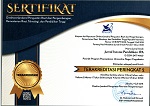Identifikasi Kapabilitas, Kecemasan, dan Ketahanan pada Kepemimpinan Transformatif Chief Executive Officer
Abstract
Kajian ini bertujuan untuk mengidentifikasi kapabilitas, kecemasan, dan ketahanan dalam kepemimpinan transformatif chief executive officer. Kajian ini menggunakan pendekatan kualitatif dengan metode deskriptif analitis. Informan dalam kajian ini yaitu chief executive officer dari beberapa perusahaan swasta terkemuka di Indonesia yang dipilih menggunakan teknik purposive sampling. Pengumpulan data dalam kajian ini menggunakan teknik wawancara mendalam. Data dianalisis menggunakan model interaktif Miles dan Huberman. Hasil kajian menunjukkan bahwa kapabilitas dalam kepemimpinan transformatif chief executive officer meliputi keterampilan politik untuk berinteraksi dengan berbagai pemangku kepentingan serta kepribadian yang ramah. Kecemasan chief executive officer dalam melaksanakan kepemimpinan transformatif bersumber dari faktor internal dan eksternal yang dapat mempengaruhi kemampuannya membuat keputusan. Ketahanan dalam kepemimpinan transformatif chief executive officer dipengaruhi oleh efikasi diri atas kemampuannya menghadapi masalah dan impulsive control untuk mengambil keputusan dengan bijaksana.
Keywords
Full Text:
PDFReferences
Ali, Z., Zwetsloot, I. M., & Nada, N. (2019). An Empirical Study to Explore the Interplay of Managerial and Operational Capabilities to Infuse Organizational Innovation in SMEs. Procedia Computer Science, 158, 260-269.
Avolio, B. J., & Gardner, W. L. (2005). Authentic Leadership Development: Getting To The Root of Positive Forms of Leadership. The Leadership Quarterly, 16(3), 315-338.
Barling, J., & Cloutier, A. (2017). Leaders’ Mental Health at Work: Empirical, Methodological, and Policy Directions. Journal of Occupational Health Psychology, 22(3), 394-406.
Barrales-Molina, V., Bustinza, O. F., & Gutiérrez, L. J. (2013). Explaining the Causes and Effects of Dynamic Capabilities Generation: A Multiple-Indicator Multiple-Cause Modelling Approach. British Journal of Management, 24(4), 571-591.
Begum, S., Xia, E., Mehmood, K., Iftikhar, Y., & Li, Y. (2020). The Impact of CEOs’ Transformational Leadership on Sustainable Organizational Innovation in SMEs: A Three-Wave Mediating Role of Organizational Learning and Psychological Empowerment. Sustainability, 12(20), 1-16.
Bono, J. E., & Judge, T. A. (2004). Personality and Transformational and Transactional Leadership: A Meta-Analysis. Journal of Applied Psychology, 89(5), 901-910.
Branche, D. (2014). Transformational Leadership and Resilience: African-American Women Nonprofit Leaders: A Mixed-Methods Study. Harrisonburg: James Madison University.
Burnard, K., Bhamra, R., & Tsinopoulos, C. (2018). Building Organisational Resilience: Four Configurations. IEEE Transactions on Engineering Management, 65(3), 351-362.
Carmeli, A., Friedman, Y., & Tishler, A. (2013). Cultivating A Resilient Top Management Team: The Importance of Relational Connections and Strategic Decision Comprehensiveness. Safety Science, 51(1), 148-159.
Chemers, M. M., Watson, C. B., & May, S. T. (2000). Dispositional Affect and Leadership Effectiveness: A Comparison of Self-Esteem, Optimism, and Efficacy. Personality and Social Psychology Bulletin, 26(3), 267-277.
Chen, Y., Tang, G., Jin, J., Xie, Q., & Li, J. (2014). CEOs’
Transformational Leadership and Product Innovation Performance: The Roles of Corporate Entrepreneurship and Technology Orientation. Journal of Product Innovation Management, 31(1), 2-17.
Corbin J., & A. Strauss A. (1990). Grounded Theory Research: Procedures, Canons, and Evaluative Criteria. Qualitative Sociology, 19(6), 418-427.
Cortellazo, L., Bruni, E., & Zampieri, R. (2019). The Role of Leadership in a Digitalized World: A Review. Fronters in Psychology, 10(1938), 1-21.
Creswell, J. W. (2017). Research Design: Qualitative, Quantitative, and Mixed. Methods Approaches. California: Sage Publication.
Duchek, S., Raetze, S., & Scheuch, I. (2020). The Role of Diversity in Organizational Resilience: A Theoretical Framework. Business Research, 13(2), 387-423.
Eisenbeiss, S. A., Knippenberg, D. V., & Boerner, S. (2008). Transformational Leadership and Team Innovation: Integrating Team Climate Principles. Journal of Applied Psychology, 93(6), 1438-1446.
Fainshmidt, S. (2014). Dynamic Capabilities and Resilient Organizations Amid Environmental Jolts. Norfolk: Old Dominion University.
Flotman, A. P. (2020). Language Use as a Manifestation of Leadership Anxiety Dynamics: A Conceptual Analysis and Systems Psychodynamic Model. Journal of Contemporary Management, 17(2), 225-249.
Foerster, C., & Duchek, S. (2017). What Makes Leaders Resilient? An Exploratory Interview Study. German Journal of Human Resource Management, 31(4), 281-306.
Gardner, W. L., & Stough, C. (2002). Examining The Relationship Between Leadership and Emotional Intelligence in Senior Level Managers. Leadership & Organization Development Journal, 23(2), 68-78.
Giorgi, G., Mancuso, S., Perez, F. J. F., Montani, F., Courcy, F., & Arcangeli, G. (2015). Does Leaders’ Health (and Work-Related Experiences) Affect their Evaluation of Followers’ Stress?. Safety and Health at Work, 6(3), 249-255.
Harland, L., Harrison, W., Jones, J. R., & Reiter-Palmon, R. (2005). Leadership Behaviors and Subordinate Resilience. Journal of Leadership & Organizational Studies, 11(2), 2-14.
Harms, P. D., & Crede, M. (2010). Emotional Intelligence and Transformational and Transactional Leadership: A Meta-Analysis. Journal of Leadership & Organizational Studies, 17(1), 5-17.
Jacobs, C. M. (2019). Ineffective-Leader-Induced Occupational Stress. Sage Journals, 9(2), 1-15.
Judge, T. A., Bono, J. E., Ilies, R., & Gerhardt, M. W. (2002). Personality and Leadership: A Qualitative and Quantitative Review. Journal of Applied Psychology, 87(4), 765-780.
Judge, T. A., & Piccolo, R. F. (2004). Transformational and Transactional Leadership: A Meta-Analytic Test of Their Relative Validity. Journal of Applied Psychology, 89(5), 755-768.
Kane, T. D., & Tremble, T. R. (2000). Transformational Leadership Effects at Different Levels Of The Army. Military Psychology, 12(2), 137-160.
Kellett, J. B., Humphrey, R. H., & Sleeth, R. G. (2006). Empathy and The Emergence of Task and Relations Leaders. The Leadership Quarterly, 17(2), 146-162.
Kelloway, E. K., & Barling, J. (2010). Leadership Development As An Intervention in Occupational Health Psychology. Work & Stress, 24(3), 260-279.
Kraiczy, N. D., Hack, A., & Kellermanns, F. W. (2015). What Makes a Family Firm Innovative? CEO Risk-Taking Propensity and the Organizational Context of Family Firms. Journal Product Innovation Management, 32(3), 334-348.
Mannor, M. J., Wowak, A. J., Bartkus, V. O., & Gomez-Mejia, L. R. (2015). Heavy Lies the Crown? How Job Anxiety Affects Top Executive Decision Making in Gain and Loss Contexts. Strategic Management Journal, 37(9), 1968-1989.
McCormick, M. J. (2001). Self-Efficacy and Leadership Effectiveness: Applying Social Cognitive Theory to Leadership. Journal of Leadership & Organizational Studies, 8(1), 22-33.
Nielsen, M. B., Skogstad, A., Gjerstad, J., & Einarsen, S. V. (2019). Are Transformational and Laissez-Faire Leadership Related to State Anxiety Among Subordinates? A Two-Wave Prospective Study of Forward and Reverse Associations. Work & Stress, 33(2), 137-155.
Nieto, M. J., Santamaria, L., & Fernandez, Z. (2015). Understanding the Innovation Behavior of Family Firms. Journal of Small Business Management, 53(2), 382-399.
Nugraha, R. R., Hamidah, S., & Fadli, M. (2018). Makna Kepatutan dan Kewajaran Berkaitan dengan Tanggung Jawab Sosial Perusahaan dalam Undang-Undang Nomor 40 Tahun 2007 tentang Perseroan Terbatas. Jurnal Ilmiah Pendidikan Pancasila dan Kewarganegaraan, 3(2), 176-185.
Ogola, M. G. O., Sikalieh, D., & Linge, T. K. (2017). The Influence of Intellectual Stimulation Leadership Behaviour on Employee Performance in SMEs in Kenya. International Journal of Business and Social Science, 8(3), 89-100.
Peters, Y. (2019). Exploring Leadership Skills for the Sustainability of Small and Medium-Sized Enterprises. Minneapolis: Walden University.
Rubin, R. S., Munz, D. C., & Bommer, W. H. (2005). Leading from Within: The Effects of Emotion Recognition and Personality on Transformational Leadership Behavior. Academy of Management Journal, 48(5), 845-858.
Ruiz-Jimenez, J. M., & Fuentes, M. D. (2016). Management Capabilities, Innovation, and Gender Diversity in the Top Management Team: An Empirical Analysis in Technology-Based SMEs. Business Research Quarterly, 19(2), 107-121.
Sahyaja, C., & Rao, K. S. S. (2018). New Leadership in the Digital Era: A Conceptual Study on Emotional Dimensions in Relation with Intellectual Dimensions. International Journal of Civil Engineering and Technology, 9(1), 738-747.
Saunila, M., & Ukko, J. (2013). Facilitating Innovation Capability Through Performance Measurement. Management Research Review, 36(10), 991-1010.
Saunila, M., Pekkola, S., & Ukko, J. (2019). The Relationship Between Innovation Capability and Performance. International Journal of Productivity and Performance Management, 63(2), 234-249.
Sawalha, I. H. S. (2015). Managing Adversity: Understanding Some Dimensions of Organizational Resilience. Management Research Review, 38(4), 346-366.
Sirén, C., Patel, P. C., Örtqvist, D., & Wincent, J. (2018). CEO Burnout, Managerial Discretion, and Firm Performance: The Role of CEO Locus of Control, Structural Power, and Organizational Factors. Long Range Planning, 51(6), 953-971.
Sommer, S., Amy, J. M. H., & Hadley, C. N. (2016). Keeping Positive and Building Strength: The Role of Affect and Team Leadership in Developing Resilience During an Organizational Crisis. Group and Organization Management, 41(2), 172-202.
Staw, B. M., Sandelands, L. E., & Dutton, J. E. (1981). Threat-Rigidity Effects in Organizational Behavior: A Multilevel Analysis. Administrative Science Quarterly, 26(4), 501-524.
Trisliatanto, D. A. (2020). Research Methodology: A Complete Guide to Research with Ease. Yogyakarta: Andi Publisher.
Walumbwa, F. O., Avolio, B. J., & Zhu, W. (2008). How Transformational Leadership Weaves Its Influence on Individual Job Performance: The Role of Identification and Efficacy Beliefs. Personnel Psychology, 61(4), 793-825.
Williams, T. A., Gruber, D. A., Sutcliffe, K. M., Shepherd, D. A., & Zhao, E. Y. (2017). Organizational Response to Adversity: Fusing Crisis Management and Resilience Research Streams. Academy of Management Annals, 11(2), 733-769.
Wilson, S. (2020). Pandemic Leadership: Lessons from New Zealand’s Approach to COVID-19. Leadership, 16(3), 279-293.
Yasin, G., Nawab, S., Bhatti, K. K., & Nazir, T., (2014). Relationship of Intellectual Stimulation, Innovations and SMEs Performance: Transformational Leadership a Source of Competitive Advantage in SMEs. Middle-East Journal of Scientific Research, 19(1), 74-81.
Yogahastama, R., & Fajar, M. I. (2020). Implikasi Penetapan Darurat Masa Covid-19 sebagai Keadaan Force Majeure Pada Perjanjian Sektor Pariwisata. Jurnal Ilmiah Pendidikan Pancasila dan Kewarganegaraan, 5(2), 398-409.
Youssef, C. M., & Luthans, F. (2007). Positive Organizational Behavior in The Workplace: The Impact of Hope, Optimism, and Resilience. Journal of Management, 33(5), 774-800.
DOI: http://dx.doi.org/10.17977/um019v9i2p159-167
Refbacks
- There are currently no refbacks.
Copyright (c) 2024 Jurnal Ilmiah Pendidikan Pancasila dan Kewarganegaraan

This work is licensed under a Creative Commons Attribution 4.0 International License.
View My Stats











